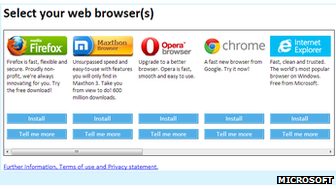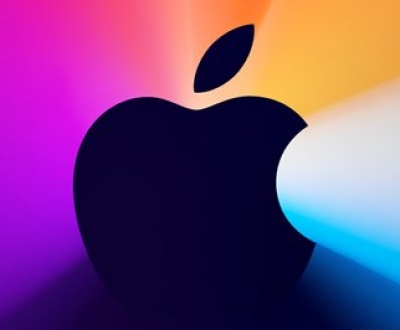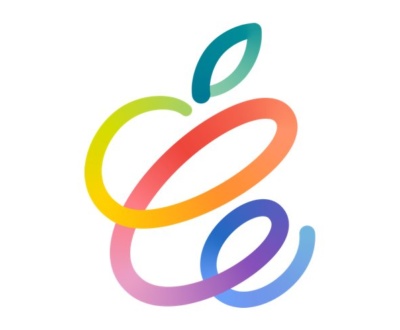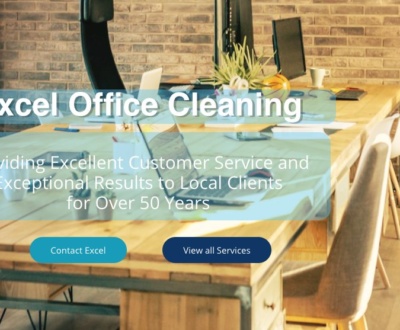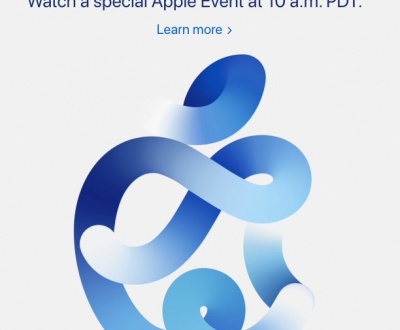The big boys of Brussels have fined Microsoft a whopping 561 million euros (£484m) for failing to promote a range of competing web browsers, rather than just Internet Explorer, to users in the European Union .
Microsoft was forced to introduce a Browser Choice Screen pop-up in March 2010 as part of a settlement following an earlier EU competition investigation. And then dropped the feature in a Windows 7 update in February 2011.
Microsoft said the omission had been the result of a “technical error”. Rather like the dog ate my homework. Maybe the Redmond folk just ignored the EC for some time. Maybe they have a global product. Who knows?
But EC competition commissioner Joaquin Almunia said the action was unprecedented, adding he wanted to deter any company from the “temptation” of reneging on such a promise.
In theory the EC watchdog could have fined the firm 10% of its global annual revenue, which would have totalled $7.4bn based on its 2012 report.
“We take full responsibility for the technical error that caused this problem and have apologised for it,” a spokesman for Microsoft said following the announcement.
“We provided the Commission with a complete and candid assessment of the situation, and we have taken steps to strengthen our software development and other processes to help avoid this mistake – or anything similar – in the future.”
One lawyer said the ruling was also intended to send out a message to others.
“The European Commission is sending a firm signal in this first case of its type that it will not tolerate failure by a company to comply with the commitments it gave to settle an antitrust infringement procedure,” said Tony Woodgate from Simmons & Simmons.
“These ‘commitments decisions’ are currently the European Commission’s favoured mechanism to close abuse of dominance proceedings, saving enforcement resource and allowing for a speedy resolution.”
Browser ‘oversight’
The case dates back to 2007 when Opera – a Norwegian web-browser maker – complained Microsoft was stifling competition on PCs by bundling Internet Explorer with its operating system. This has always been in our mind a highly dubious claim. There are plenty of browsers out there, if you want to look. Savvy users know that and download Firfox, Chrome and Safari in huge numbers. And less savvy users, have little or no idea what a browse is and having a choice is just baffling. Corporate users are at the hands of an IT department and most likely are forced to use only one browsing product. In some cases IE 6.
So who has this benefited? The only EC firm with a browser is the Norwegian firm Opera, who originally developed a mobile browser that competed against WAP and other early mobile web standards. As mobile devices grew in power and screen size then need for a special mobile browser like Opera and WAP diminished greatly. Then with the launch of the iPhone with Safari as a browser and the rise of Android with Chrome and Windows mobile with a version of IE the OEM channel for Opera trended to zero.
What is even more ridiculous is that this is not even the real question to ask, the browser is largely irrelevant. The big question is what Search Engine do you use? Here we know that irrespective of the browser used by a computer operator the vast majority use Google for search. The Windows default is Microsoft IE with Bing. We know from our Google analytics from dozens of UK websites reporting from tens of thousands of user website visits that most search results come from Google.
Any serious company or market would have redrawn their business plan and moved on. But no, the EC claim that Microsoft is a monopoly and must give, no force users to make a choice. This was plain and wrong.
Is it no wonder that most Americans see Europe and the EC as a meddling bureaucratic system one step away from communist? This in turn reduces inward investment and development, especially in technology.
Microsoft initially argued that the move benefited users, but after the European Commission issued a preliminary report suggesting the firm had abused its position, the company agreed to offer a choice of browser until at least 2014 to avoid risking a fine.
However, this option was missing from its Windows 7 Service Pack 1 released in 2011 and it continued to be absent for 14 months.
During that time, Microsoft reported it was still complying with the agreement.
After the EU was alerted to the problem, it contacted Microsoft, which subsequently issued an apology suggesting its engineers had accidentally missed the issue.
It also acted to restore the facility. But the move was not enough to prevent an eight-month follow-up investigation by the commission into what punishment was needed.
Warning to others
At a press conference in Brussels, Mr Almunia said Microsoft’s lack of compliance represented a “serious breach” and was the first time a firm had failed to meet such a commitment.
He explained that he preferred negotiated settlements, rather than extended legal battles, when tackling competition complaints in the fast-moving IT sector.
But he added that Microsoft’s willingness to co-operate with the EU’s subsequent investigation had acted as a mitigating factor when determining the level of the fine.
“I hope this will make companies think twice before they ever thinking of breaching their international obligations,” said the commissioner.
Microsoft’s chief executive Steve Ballmer and the former head of its Windows division Steven Sinofsky have already had their most recent bonuses docked, in part because of the browser affair.
Opera commented that it was “happy to see that the Commission is enforcing compliance with the commitment, which is critical to ensuring a genuine choice among web browsers for consumers”.
However, one industry watcher suggested there were still unresolved issues,
“While it’s highly likely that it was a technical mistake that broke the browser choice facility the fact that it remained broken for 14 months raises significant questions about Microsoft’s ability and willingness to comply with the voluntary agreement with the EU,” said Chris Green, principal analyst at the consultants Davies Murphy Group Europe.
“At the same time the situation also raises concerns over the EU’s ability to actually monitor the outcomes of antitrust agreements.” One would have thought that it would take just one member of the EC to question “where is my browser choice”. But no, it has taken years and most likely tens of millions of Euros to uncover what Microsoft did.
About us and this blog
We are a digital marketing company with a focus on helping our customers achieve great results across several key areas.
Request a free quote
We offer professional SEO services that help websites increase their organic search score drastically in order to compete for the highest rankings even when it comes to highly competitive keywords.


